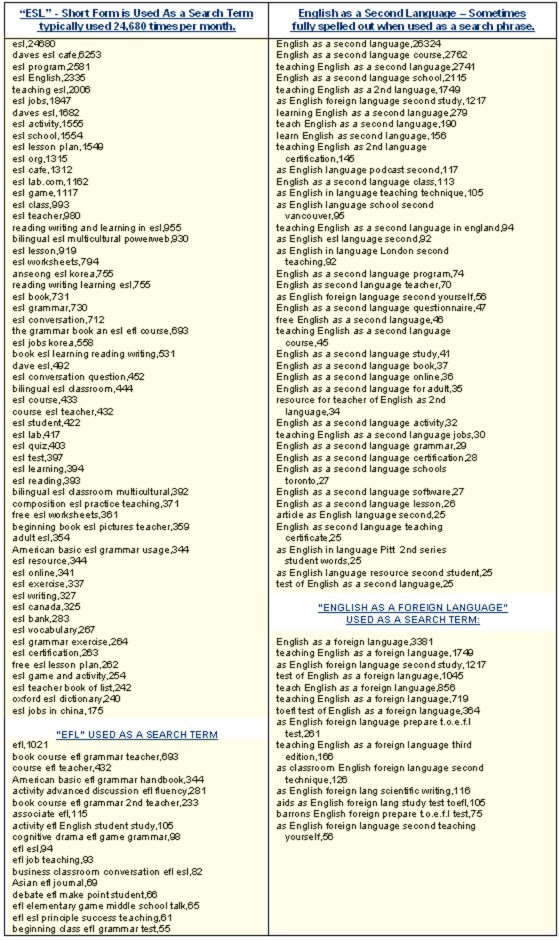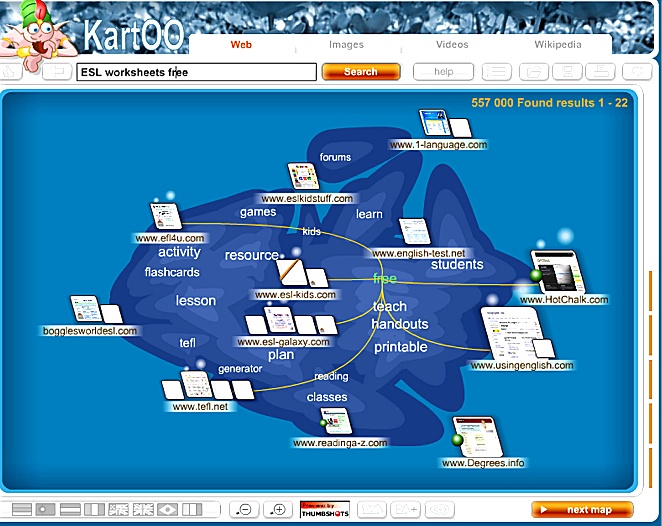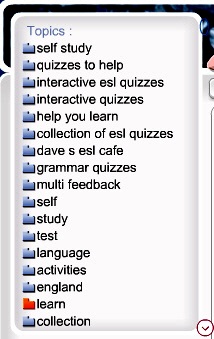
Links and Resources Related to Teaching
English as a Second or Foreign Language
ESL Research Strategies
If you're involved in teaching English as a second language, you'll find new and improved ESL resources appearing almost every month. The search engines are your friend, but not if you search for "ESL" or "ENGLISH AS A SECOND LANGUAGE."
If you don't narrow your search you'll get back millions of pages that the search engines have indexed throughout the world - even from web sites in non-English countries. Out of millions of available web pages, you're unlikely to see more that a few results that happen to be on the first five or ten pages of results - assuming you scroll down. But you can't pick out useful results from millions and millions of search engine results.
Here's what happened when we naively searched for these four general terms:
ESL (Short abbreviation all alone) - 117 million results.
English as a Second Language - (Fully spelled out) - 167 million results.
EFL (Short abbreviation all alone) - 5,390,000 results.
English as a Foreign Language (Spelled out fully) - 117 million results.
For this reason, more thoughtful phrases should be used rather than those shown above. Since the search engines keep a count of every word and phrase that we enter in as search words, you may benefit from scanning through the search phrases that other people have used.
You can see that the most popular words and phrases below were also the thoughtless ones shown above. But observe below how many people narrowed their searches by thinking more exactly about their desired goals. Scan the list below to get some ideas. The numbers indicate how many people IN ONE MONTH thought to enter each phrase.
The LEAST THOUGHTFUL search terms in the table below are at the top of the lists. They were most frequently entered and probably without realizing how useless the results would be. As you go down the table lists you'll see how some people narrowed their results by adding more words to the search phrase.
The phrases below are in descending order. In other words, 24,680 people typically - per month - type in "ESL" , whereas 262 people per month type in "FREE ESL LESSON PLAN." All examples are valuable, of course, depending on the information you hope to discover.

Google and Yahoo-Overture search engines have very large collections of indexed materials and their popularity is well known. Be aware, however, that if you do your search a second time using a different search engine, vastly different results will appear.
Contrary to popular thought, the information you get on the top fifty pages, for example, usually overlaps only 1.1% with other search engines. Almost all of them return different results. That's because they each have different rules about the order in which items should appear. An item near the top on one search engine results may appear down on page 300,000 in another search engine.
A recent university study uncovered these facts:
♦ By searching only "Google" a searcher can miss 72.7% of the Web’s best first page search results.
♦ By searching only "Yahoo!" a searcher can miss 69.2% of the Web’s best first page search results.
♦ By searching only "Live Search" a searcher can miss 69.9% of the Web’s best first page search results.
♦ By searching only "Ask.com" a searcher can miss 73.0% of the Web’s best first page search results.
This information is from a university white paper on this topic at This Address - Click Here.
There are unique search services that attempt to overcome this problem. The are set up to automatically search four or five search engines concurrently. Try http://DOGPILE.COM for example. It searches "Yahoo," "Google," "ASK.com," and "Live Search" all at the same time.
Meta-search services pass your search request to multiple search engines, bringing back a surprisingly larger variety of top materials. DOGPILE.COM makes a good homepage.
Other Metasearch services are at:
http://Clusky.com/
http://www.surfwax.com/
http://www.customsearchengine.com/
http://www.copernic.com/en/products/agent/download.html
One last suggestion suggestion related to ESL research and resources:
Please bring up this unique search site: http://kartoo.com
Then type in "ESL" as your search term. If you get a white screen that means that Adobe "Flash" hasn't been installed yet. Go back and on the front page click to install the required "Flash" product.
The search results are startling because they're in graphic and map-diagram form, designed to show relationships between various topics. For the screen sample below, the search was for "FREE ESL WORKSHEETS."


Slowly move your mouse around the KartOO screen. Magical lines appear that show relationships and each set of lines is coordinated with a menu list shown here on the bottom right.
You can click on the menu and new "drill-down" screens will appear.
You can click on the curvy branch items that extend out from the center of the diagram to drill down further and further.
Years of programming went into this clever graphic display of search results. New and better materials are invented quite often for ESL teachers and KartOO.com may enable creative searching for new and better teaching materials.
If you have not visited the twin ESL page on our ALC site menu called ESL STRATEGIES , please click to go there to review a new approach when introducing foreign born persons to the English language. We believe it to be new information not previously published related to the teaching of English to foreign born persons.
(tm) Various corporate trademarks were referenced on this page.